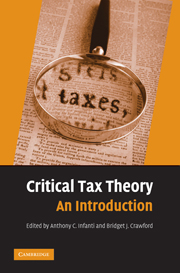Book contents
- Frontmatter
- Contents
- List of Illustrations
- List of Tables
- List of Contributors
- List of Common Abbreviations
- Introduction
- CHAPTER 1 FOUNDATIONS OF CRITICAL TAX THEORY
- CHAPTER 2 HISTORICAL PERSPECTIVES ON TAXATION
- CHAPTER 3 THE GOALS OF TAX POLICY
- CHAPTER 4 CRITICAL TAX THEORY MEETS PRACTICE
- CHAPTER 5 RACE AND TAXATION
- CHAPTER 6 GENDER AND TAXATION
- CHAPTER 7 SEXUAL ORIENTATION AND TAXATION
- CHAPTER 8 THE FAMILY AND TAXATION
- CHAPTER 9 CLASS AND TAXATION
- CHAPTER 10 DISABILITY AND TAXATION
- CHAPTER 11 GLOBAL CRITICAL PERSPECTIVES ON TAXATION
- CHAPTER 12 CRITICAL PERSPECTIVES ON CRITICAL TAX THEORY
- Index
CHAPTER 7 - SEXUAL ORIENTATION AND TAXATION
Published online by Cambridge University Press: 04 August 2010
- Frontmatter
- Contents
- List of Illustrations
- List of Tables
- List of Contributors
- List of Common Abbreviations
- Introduction
- CHAPTER 1 FOUNDATIONS OF CRITICAL TAX THEORY
- CHAPTER 2 HISTORICAL PERSPECTIVES ON TAXATION
- CHAPTER 3 THE GOALS OF TAX POLICY
- CHAPTER 4 CRITICAL TAX THEORY MEETS PRACTICE
- CHAPTER 5 RACE AND TAXATION
- CHAPTER 6 GENDER AND TAXATION
- CHAPTER 7 SEXUAL ORIENTATION AND TAXATION
- CHAPTER 8 THE FAMILY AND TAXATION
- CHAPTER 9 CLASS AND TAXATION
- CHAPTER 10 DISABILITY AND TAXATION
- CHAPTER 11 GLOBAL CRITICAL PERSPECTIVES ON TAXATION
- CHAPTER 12 CRITICAL PERSPECTIVES ON CRITICAL TAX THEORY
- Index
Summary
Lesbians and gay men are in the unique position of being the only subordinated group that is the object of both overt and covert invidious discrimination in the application of the tax laws. This chapter features the work of three scholars who have criticized the tax laws' biases against lesbian and gay taxpayers.
Reading Patricia Cain's 1991 article Same-Sex Couples and the Federal Tax Laws reminds the twenty-first century reader of the old adage that “the more things change, the more they stay the same.” In this article, which predates both the federal Defense of Marriage Act and the advent of same-sex marriage, civil unions, and domestic partnerships, Cain uses a hypothetical lesbian couple to illustrate the thorny income and gift tax issues that same-sex couples face when they share income and property. To ameliorate the problem, she suggests an interpretation of the tax laws that would render transfers from one partner to another tax-free under both the income tax and the gift tax. Importantly (and to critical tax scholars, unfortunately), even with all of the recent advances made by same-sex couples in obtaining access to the rights and obligations of marriage, Cain's analysis remains as relevant today as it was the day it was written.
In The Internal Revenue Code as Sodomy Statute, Anthony Infanti picks up on Cain's theme. Using personal narrative, he counters the misguided assertion of some mainstream tax scholars that lesbian and gay taxpayers cannot claim to be victims of discrimination until they quantifiably demonstrate that all of the detriments of not having their relationships recognized for tax purposes outweigh any benefits of being treated as strangers for tax purposes.
- Type
- Chapter
- Information
- Critical Tax TheoryAn Introduction, pp. 183 - 184Publisher: Cambridge University PressPrint publication year: 2009



